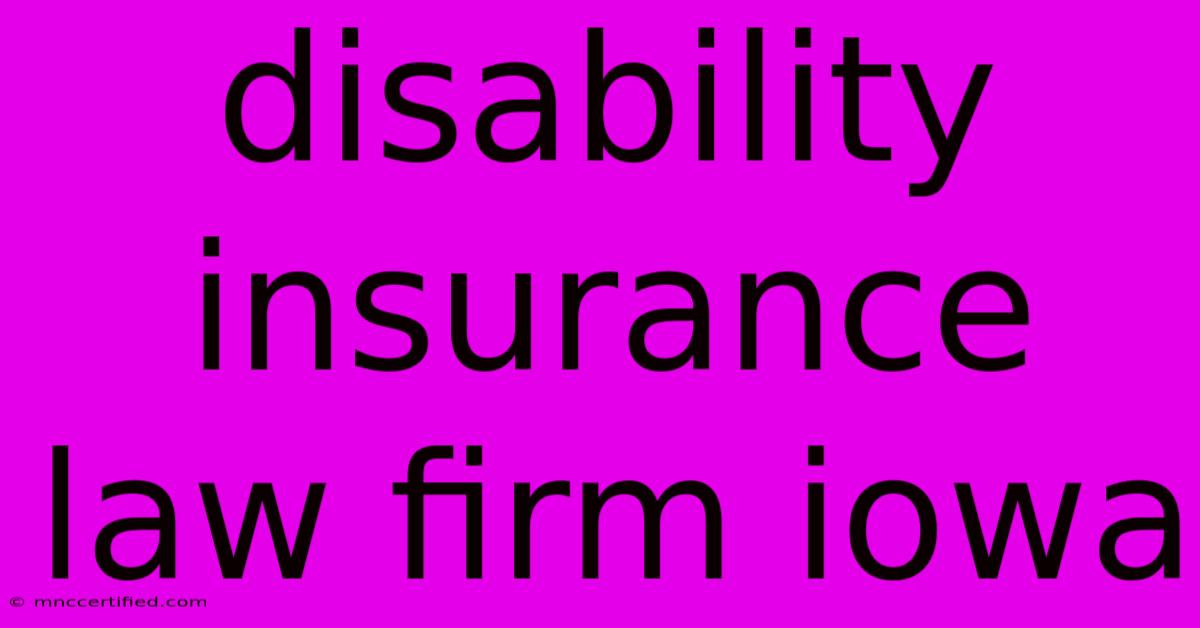Disability Insurance Law Firm Iowa

Table of Contents
Navigating Disability Insurance Claims in Iowa: Finding the Right Legal Help
Facing a disability insurance claim denial can be incredibly stressful and financially devastating. In Iowa, understanding your rights and navigating the complex legal landscape is crucial to securing the benefits you deserve. This article will guide you through the process of finding a qualified disability insurance law firm in Iowa and highlight key aspects of disability insurance law.
Understanding Iowa Disability Insurance Law
Iowa, like other states, doesn't have specific laws solely dedicated to disability insurance claims. However, Iowa law, along with federal laws like the Employee Retirement Income Security Act of 1974 (ERISA), governs these claims. ERISA applies to many employer-sponsored disability insurance plans, while individual disability insurance policies fall under state contract law.
The complexities of these laws mean that successfully pursuing a claim often requires legal expertise. A knowledgeable Iowa disability lawyer can:
- Review your policy: They will thoroughly analyze your policy's terms and conditions, identifying potential loopholes or grounds for appeal.
- Gather and present evidence: Building a strong case requires comprehensive medical documentation, witness statements, and other evidence demonstrating your disability. An attorney will help you gather and present this evidence effectively.
- Negotiate with insurers: Insurance companies often employ aggressive tactics to deny or minimize claims. A lawyer acts as your advocate, negotiating with the insurer to reach a fair settlement.
- Represent you in court: If negotiations fail, your attorney will represent you in court, litigating your case to secure the benefits you're entitled to.
Choosing the Right Disability Insurance Law Firm in Iowa
Finding the right disability insurance attorney in Iowa is a critical first step. Here's what you should consider:
Experience and Specialization:
- Look for firms specializing in disability insurance law: Experience in handling these complex cases is paramount. Attorneys with a proven track record of success are more likely to achieve favorable outcomes.
- Check their success rate: While not always publicly available, a firm's reputation and past successes should be investigated. Online reviews and testimonials can be helpful, but independent verification is recommended.
Communication and Client Service:
- Choose a firm that communicates clearly and promptly: You need an attorney who will keep you informed about the progress of your case and answer your questions thoroughly.
- Consider client testimonials and reviews: These provide valuable insight into the firm's responsiveness, professionalism, and overall client experience.
Fee Structure:
- Understand the fee arrangement upfront: Most disability insurance lawyers work on a contingency fee basis, meaning they only get paid if they win your case. However, it's vital to understand the percentage they will receive and any other associated costs.
Geographic Location:
- While some firms may represent clients statewide, proximity can be helpful: Easier access to in-person meetings can be beneficial, particularly during the initial stages of your claim.
Key Considerations for Your Iowa Disability Claim
Before contacting a disability lawyer in Iowa, gather the following information:
- Your disability insurance policy: This includes the policy number, effective date, and details of your coverage.
- Medical records: Comprehensive medical documentation, including doctor's notes, test results, and treatment plans, is essential.
- Employment history: Information about your job duties, work limitations, and any accommodations provided by your employer is crucial.
Taking Action: Your First Steps
Don't delay seeking legal help if your disability insurance claim has been denied or is unreasonably delayed. Contact several Iowa disability insurance law firms for initial consultations. These consultations often provide valuable insights into your legal options and the likelihood of a successful claim. Remember, obtaining the right legal representation can significantly improve your chances of securing the benefits you need.
Disclaimer: This article provides general information and should not be considered legal advice. You should consult with a qualified attorney to discuss your specific situation.

Thank you for visiting our website wich cover about Disability Insurance Law Firm Iowa. We hope the information provided has been useful to you. Feel free to contact us if you have any questions or need further assistance. See you next time and dont miss to bookmark.
Featured Posts
-
Geico Insurance Card Template 2023
Nov 17, 2024
-
Does Insurance Cover Siding Damage
Nov 17, 2024
-
Ufc 309 Fight Card And Uk Viewing
Nov 17, 2024
-
Rugby Englands Autumn Nations Loss
Nov 17, 2024
-
Complete Coverage Insurance Agency
Nov 17, 2024